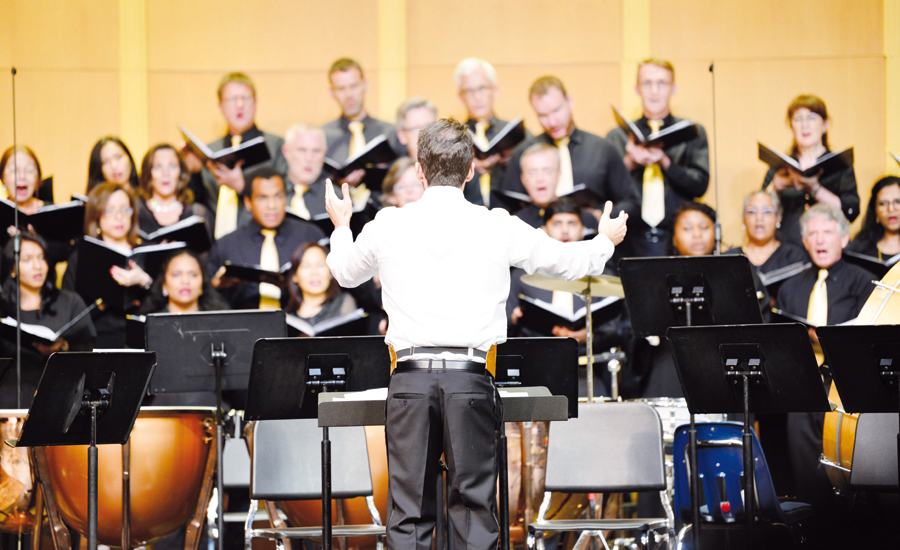

Georgina Benison -
Under the youthful baton of their latest conductor, The Muscat Singers seem to be growing ever onwards and upwards. On Saturday afternoon saw an eclectic musical offering at the Bosch Centre for the Performing Arts at TAISM from the 50-strong Muscat Singers, with Musical Director, Andrew Elbin, steering a broad programme of songs under the theme of “Love”. On this occasion they were joined by 16 fine musicians from Muscat Brass, conducted by Darrol Barry, and the delightful PDO School choir with John Talbot.
If that were not a wide enough canvas, there were also drums, tuned percussion, recorders, an oboe, violin and ‘cello. Last but not least, the superb piano playing of David Posnett as accompanist and soloist embellished the whole performance.
The show opened in Medieval mode with the choir at the front of the stage, clapping and stomping in “Glad We Be this Day”, an English Madrigal arranged by Phyllis Wolfe, with a consort of bass, tenor and descant recorders and trio of percussion accompaniment, kicking the evening off to a great start.
It was immediately followed by a light-hearted rendering of Thomas Morely’s famous, “April is in My Mistress’ Face”, a tongue in cheek song in which the complainant mourns his sweet-heart’s cold demeanour. It was beautifully sung, and the choir seems to become more cohesive and balanced with each season.
In a change of style and period altogether, Brahms’ “O Shone Nacht” was a challenging piece of Romantic writing which the Singers carried off splendidly. The intonation is demanding and reflects their developing technique of ensemble singing.
Suddenly a scattering of bodies brought the women to the front in a huge arc while the men disappeared. The ladies sang a haunting melody, “Be Like The Bird” in four-part cannon with eerie poignancy which echoed round the hall. The group re-assembled, with six soloists at the front, for a humorous interpretation by Drew Collins of the English folk song, “Oh Dear, What Can the Matter Be?”, with Frank Mattern playing ‘Johnny’ and teasing the girls by refusing to deliver gifts from the fair, much to the frustration of the six jilted ladies.
The men got their own back as revelling sailors in the traditional French drinking song, “Vive L’Amour”, with all the gusto and bravado you might expect from a gang of seafarers – but with much more musicality!
Pianist David Posnett performed a brilliant entr’acte, Liszt’s “Liebestraum no. 3”, with so much tenderness and warmth it was hard to believe that David will be leaving the seat, even if not Muscat, in the next season. His seasonal recitals of tricky piano works from the repertoire have become a popular main-stay of the Muscat Singers’ programmes, among audience and singers alike, and he will be sorely missed.
The first guests of the afternoon appeared on stage in the form of PDO School’s Vocalise Choir, and they began their set with Jim Papoulis’ “I Ask for One Day” endearingly performed by the 30 girls. It was followed by a lively and rhythmic version of “Love Shine a Light” by Katrina and the Waves, to CD backing rather than live piano accompaniment on this occasion.
The Muscat Singers joined the children on stage in a sensational conclusion to the first half of the concert in, “Will you teach me?” by Victor C. Johnson. It was powerful in the ‘tutti’ sections and deeply moving when the children’s choir sang alone, all against a haunting oboe counter-melody, played lovingly by Leta Slupik. It would have been hard to follow, so an interval allowed for some mingling between performers and audience.
The second half opened with some stirring brass arrangements of classics from stage and screen. Stephen Rockey’s folk arrangement of “Scarborough Fair” had trombone solos by Mark Tribble and James Gribben, who also transcribed the memorable “Love Theme” from Rimsky Korsakov’s “Scheherazade”. Most striking of all was Rockey’s arrangement of Prokofiev’s iconic “Romeo and Juliet” march, which had listeners swaying in their seats. It was powerful and rhythmic with the brass ensemble in full force. “Somewhere” from Bernstein’s ‘West Side Story’ brought us gently down to earth, showing how soft and mellow brass instruments can be when the musicians are at the top of their game, like Muscat Top Brass.
Muscat Singers filed on for the last time to join the band with an all-singing, all-dancing performance of the Beatles’ “Can’t Buy Me Love” – an ironic twist, as McCartney became rich through the success of this song, among others. It was excellent, and after the brass left, the Singers continued with a distinctly contemporary setting of e.e. cummings’s “Dominic has a Doll” by Vincent Persichetti, which sounded fiendishly difficult and fast.
The music came full circle in the last song, with a return to Robbie Burns’ 18th Century, “Oh, My Luve’s like a Red, Red Rose” arranged by Rene Clausen. It was full of the pathos you would expect from the Scottish bard, yet with a 21st century feel, sung perfectly by the choir without any hint of tiredness in their intonation or interpretation. The choir was accompanied by piano, ‘cello — played exquisitely by Zsolt Kovacs — and violin solo by the young Fionulla Payuyo, which added to the sublime quality of the arrangement.
It was not the last song, however, as the real Finale was a moving tribute to their departing accompanist of 7 years, David Posnett. It seems he was unaware of its preparation as “Blessing in the Leaving”, by the American composer Susan La Barr, was sung a cappella and the calmness of this performance instilled in the audience a sense of peace and tranquillity to carry home with them.
Oman Observer is now on the WhatsApp channel. Click here



